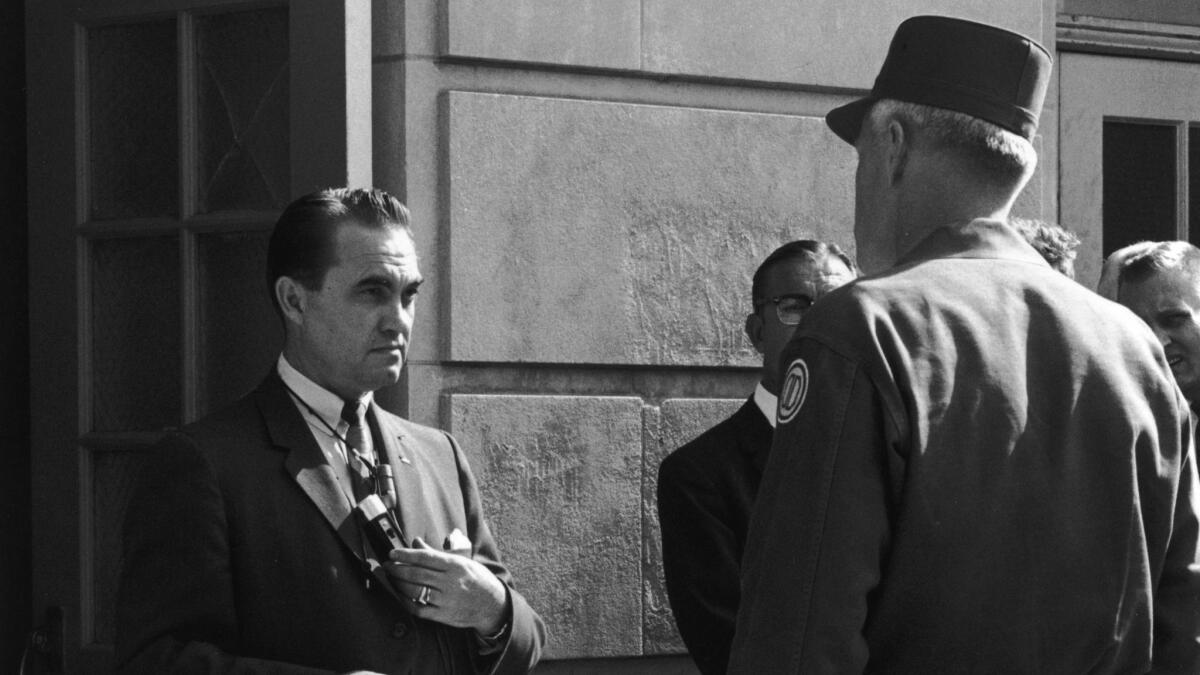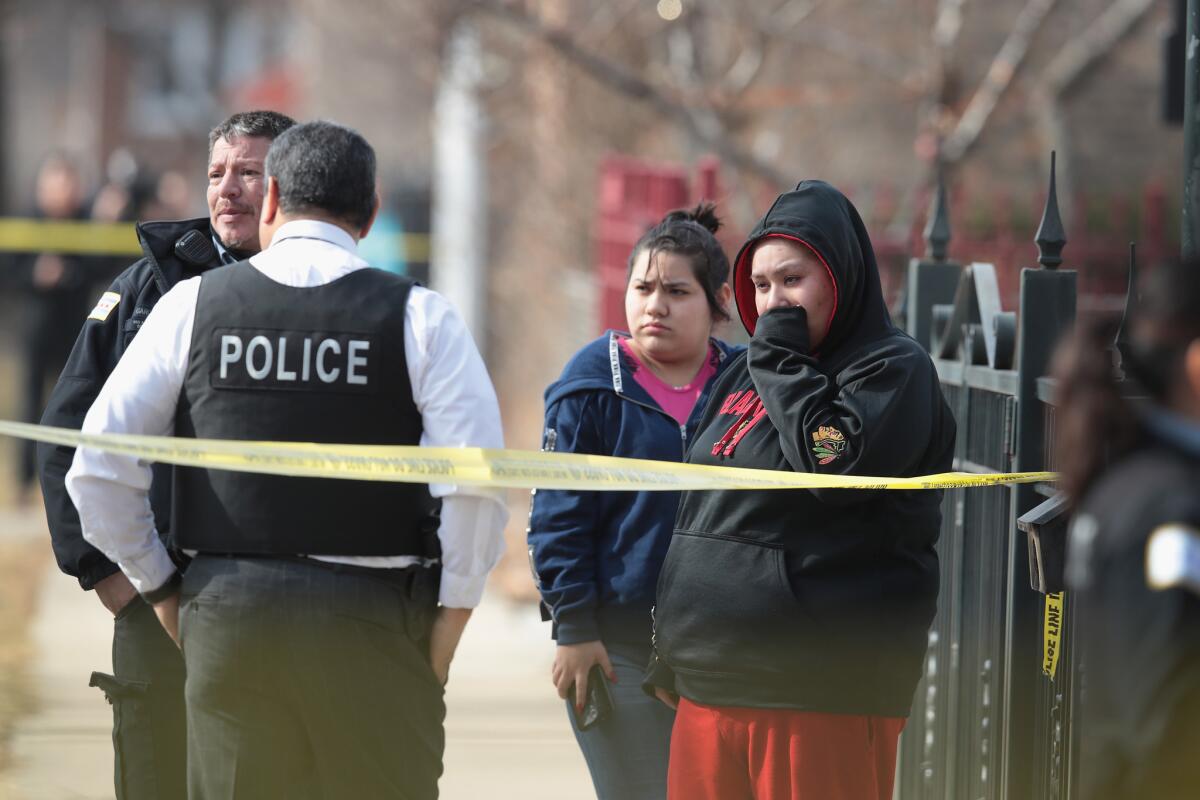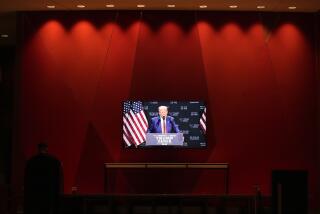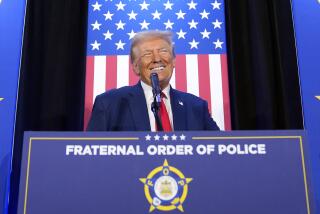Does Trump have the authority to ‘send in the feds’ to Chicago?
- Share via
A few days after moving into the White House, President Trump put the third-largest city in the country on notice: “If Chicago doesn’t fix the horrible ‘carnage’ going on, 228 shootings in 2017 with 42 killings (up 24% from 2016), I will send in the Feds!”
The president’s ominous — if vague — tweet to Chicagoans echoed back decades to when federal troops were dispatched to American cities as racial unrest roiled the country. Some activists and politicians have expressed concern about Trump’s statement, which received more than 57,000 retweets.
While Chicago often has one of the highest homicide counts in the country, it’s rare for a president to cast his focus on a specific city. Trump, it seems, is planning to change that. He also has hinted at withholding federal money from so-called sanctuary cities that don’t comply with his immigration mandates.
But can a president really send the feds — Trump’s preferred shorthand — into Chicago, or any other city?
Here are some answers:
Is there a law that allows Trump to do this?
Yes, kind of. Under the Insurrection Act of 1807, a president can deploy troops anywhere in the United States under a specific scenario.
“Whenever the President considers that unlawful obstructions, combinations, or assemblages, or rebellion against the authority of the United States make it impracticable to enforce the laws of the United States in any State by the ordinary course of judicial proceedings,” the act reads, “he may call into Federal service such of the militia of any State.”
Indeed, Abraham Lincoln used the act during the Civil War.

Is the Insurrection Act used often?
It has been used, but sparingly.
Perhaps the most high-profile example in modern times came in September 1957 when President Dwight D. Eisenhower sent federal troops to Little Rock, Ark., to help desegregate Central High School.
Three years after the U.S. Supreme Court’s landmark decision in Brown vs. Board of Education — which held that state laws allowing separate public schools for black and white students were unconstitutional — the Arkansas high school was still segregated.
When nine black students tried to enroll, Arkansas Gov. Orval Faubus ordered the state National Guard to prevent them from entering, a scene that drew headlines nationwide.
Little Rock Mayor Woodrow Wilson Mann asked Eisenhower for help. The president then federalized 10,000 Arkansas National Guardsmen and sent in 1,000 U.S. Army paratroopers. The students were eventually allowed to attend the school, though tensions remained high.
Years later the act was once again invoked.
In the fall of 1962, President Kennedy sent 30,000 troops to the University of Mississippi when riots broke out over the admission of a black student, James Meredith. In several phone conversations, Kennedy urged Mississippi Gov. Ross Barnett to uphold federal law, but he declined.
“I’m a Mississippi segregationist, and I am proud of it,” the governor said that fall.
A year later, Kennedy federalized National Guard troops and sent them to the University of Alabama to force its desegregation.
And more recently, President George W. Bush dispatched thousands of National Guard troops into the Gulf Coast region to help with disaster relief efforts after Hurricane Katrina struck in 2005.
In each case, the sitting president conferred with local officials before sending in federal enforcement.

Could the act be used for Chicago?
Not really, legal experts say.
Last year, Chicago saw 762 recorded homicides — its highest yearlong total in almost two decades, which many attribute to poverty, failing schools and a disconnect between police and the communities they patrol.
But the murder toll itself doesn’t mean the president can send in troops, says UC Berkeley law professor John Yoo.
“Simple murder is not a violation of federal law,” he said. “I don’t think the conditions in Chicago have any relationship to federal law.”
The only way Chicago’s situation could possibly fall under the Insurrection Act, Yoo said, is if the murders also violated some aspect of federal law, such as acts committed by drug cartels or terrorists.
Sudha Setty, a professor at Western New England University School of Law, said that under the Constitution police powers fall to the states and the federal government doesn’t usually have standing to make decisions for cities unless a local jurisdiction asks for help.
What does Trump have in mind for Chicago?
It’s hard to tell, though he has given hints.
During the campaign Trump also voiced support for stop-and-frisk — in which police aggressively confront people they suspect of crime — to be implemented in Chicago.
The policy, once used by many police departments, gained traction in New York under two former mayors, Rudolph W. Giuliani, a top Trump surrogate, and Michael R. Bloomberg, a fierce Trump critic. In 2013, a federal judge ruled that New York’s stop-and-frisk policy had violated the rights of blacks and Latinos.
How have Chicago officials responded to Trump’s threat?
No one has challenged him head-on.
Chicago Mayor Rahm Emanuel, former chief of staff to President Obama, has said he welcomes federal help in lowering the city’s murder count, but not by sending in troops.
“There’s a lot the federal government can do,” Emanuel told a local public television station last month, saying the government could enact stronger gun-control measures or provide money to hire more police officers.
Chicago Police Supt. Eddie Johnson said in a statement that his department was “more than willing” to work with the federal government to boost prosecution rates for gun crimes in Chicago.
Asked in August about the possibility of sending state National Guard troops into the city, Illinois Gov. Bruce Rauner, a Republican, said he had ultimately decided that wasn’t a good idea after having discussions with police and the National Guard.
“Sometimes … you get emotional and you say, ‘Well, we’ve got to do something,’” he said at the time. “You’ve got to think these things through and the implications. And the National Guard right now wouldn’t make sense.”
Twitter: @kurtisalee
ALSO
Raids across country leave immigrants and advocates on high alert
Appeals court ruling was the biggest warning to Trump yet on how he’s approaching the presidency
Waning days of the Standing Rock protests: An improvised tribe of Americans looking for ‘justice!’
More to Read
Get the L.A. Times Politics newsletter
Deeply reported insights into legislation, politics and policy from Sacramento, Washington and beyond. In your inbox three times per week.
You may occasionally receive promotional content from the Los Angeles Times.











